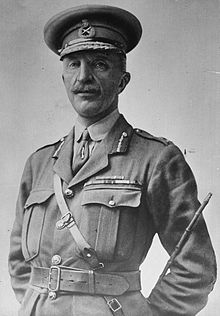Sir Henry Wilson
| Sir Henry Hughes Wilson, Bt | |
|---|---|

Field Marshal Sir Henry Hughes Wilson, 1st Baronet
|
|
| Born |
5 May 1864 County Longford, Ireland |
| Died | 22 June 1922 (aged 58) London, England |
| Allegiance | United Kingdom |
| Service/branch | British Army |
| Years of service | 1882–1922 |
| Rank | Field Marshal |
| Commands held |
Chief of the Imperial General Staff Eastern Command IV Corps Staff College, Camberley 9th Provisional Battalion, Rifle Brigade |
| Battles/wars |
Third Anglo-Burmese War Second Boer War First World War |
| Awards |
Knight Grand Cross of the Order of the Bath Distinguished Service Order Mentioned in Despatches Légion d'honneur (France) Order of Leopold (Belgium) Croix de guerre (Belgium) Order of Chia-Ha (China) Distinguished Service Medal (United States) Order of the White Elephant (Siam) Order of the Rising Sun (Japan) Order of the Redeemer (Greece) |
| Other work | Member of Parliament for North Down (1922) |
Field Marshal Sir Henry Hughes Wilson, 1st Baronet, GCB, DSO (5 May 1864 – 22 June 1922) was one of the most senior British Army staff officers of the First World War and was briefly an Irish unionist politician.
Wilson served as Commandant of the Staff College, Camberley, and then as Director of Military Operations at the War Office, in which post he played a vital role in drawing up plans to deploy an Expeditionary Force to France in the event of war. During these years Wilson acquired a reputation as a political intriguer for his role in agitating for the introduction of conscription and in the Curragh Incident of 1914, when he encouraged senior officers to resign rather than move against the Ulster Volunteers (UVF).
As Sub Chief of Staff to the British Expeditionary Force (BEF), Wilson was Sir John French's most important advisor during the 1914 campaign, but his poor relations with Haig and Robertson saw him sidelined from top decision-making in the middle years of the war. He played an important role in Anglo-French military relations in 1915 and – after his only experience of field command as a corps commander in 1916 – again as an ally of the controversial General Nivelle in early 1917. Later in 1917 he was informal military advisor to the British Prime Minister David Lloyd George, and then British Permanent Military Representative at the Supreme War Council at Versailles.
...
Wikipedia
